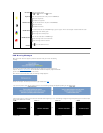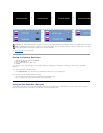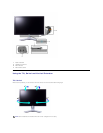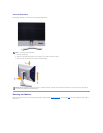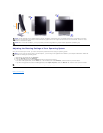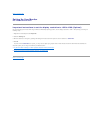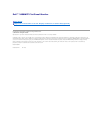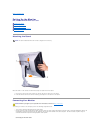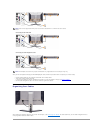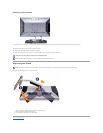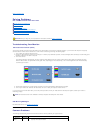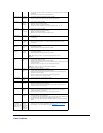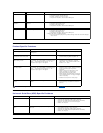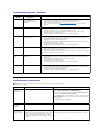
TroubleshootingtheDell™Soundbar
TroubleshootingtheCardReader
COMMON
SYMPTOMS
WHAT YOU
EXPERIENCE
POSSIBLE SOLUTIONS
No Sound
No power to Soundbar - the
power indicator is off.
(built-in DC power supply. i.e.
2408WFP)
l Turn the Power/Volume knob on the Soundbar clockwise to the middle position; check if the
power indicator (green LED) on the front of the Soundbar is illuminated.
l Confirm that the power cable from the Soundbar is plugged into the monitor.
l Confirm that the monitor has power.
l If the monitor has no power, see Monitor Specific Troubleshooting for monitor common
problem.
No Sound
Soundbar has power - power
indicator is on.
l Plug the audio line-in cable into the computer's audio out jack.
l Set all Windows volume controls to their maximum.
l Play some audio content on the computer (i.e. audio CD, or MP3).
l Turn the Power/Volume knob on the Soundbar clockwise to a higher volume setting.
l Clean and reseat the audio line-in plug.
l Test the Soundbar using another audio source (i.e. portable CD player).
Distorted Sound
Computer's sound card is used
as the audio source.
l Clear any obstructions between the Soundbar and the user.
l Confirm that the audio line-in plug is completely inserted into the jack of the sound card.
l Set all Windows volume controls to their midpoints.
l Decrease the volume of the audio application.
l Turn the Power/Volume knob on the Soundbar counter-clockwise to a lower volume setting.
l Clean and reseat the audio line-in plug.
l Troubleshoot the computer's sound card.
l Test the Soundbar using another audio source (i.e. portable CD player).
Distorted Sound
Other audio source is used.
l Clear any obstructions between the Soundbar and the user.
l Confirm that the audio line-in plug is completely inserted into the jack of the audio source.
l Decrease the volume of the audio source.
l Turn the Power/Volume knob on the Soundbar counter-clockwise to a lower volume setting.
l Clean and reseat the audio line-in plug.
Unbalanced Sound
Output
Sound from only one side of
Soundbar
l Clear any obstructions between the Soundbar and the user.
l Confirm that the audio line-in plug is completely inserted into the jack of the sound card or
audio source.
l Set all Windows audio balance controls (L-R) to their midpoints.
l Clean and reseat the audio line-in plug.
l Troubleshoot the computer's sound card.
l Test the Soundbar using another audio source (i.e. portable CD player).
Low Volume
Volume is too low.
l Clear any obstructions between the Soundbar and the user.
l Turn the Power/Volume knob on the Soundbar clockwise to the maximum volume setting.
l Set all Windows volume controls to their maximum.
l Increase the volume of the audio application.
l Test the Soundbar using another audio source (i.e. portable CD player).
NOTICE: Do not remove the device while reading or writing media. Doing so may cause loss of data or
malfunction in the media.
Problem
Cause
Solution
Drive letter is not
assigned.
(Windows XP only)
Conflict with network drive letter.
A. Right-click My Computer on the desktop, and then click Manage.
Under Computer Management, click Desk Management.
B. In the list of drives in the right panel, right-click Removable Device
and then click Change Drive Letter and Paths.
C. Click Change, and in the drop-down box, specify a drive letter for the
Removable Device, choosing one that is not assigned to the mapped
network drives.
D. Click OK, and then click OK again
Drive letter is
assigned, but the
media is not
accessible
The media needs reformatting.
Right-click the drive in Explorer and choose Format from the resulting
menu.
The media has been
ejected during
writing or erasing.
Displays the error message, "Error copying file or folder."
Displays the error message, "Cannot write folder (folder
name) or file (file name)," during writing, or, "Cannot
remove folder (folder name) or file(file name),". While
erasing, you cannot write or erase in the same folder or
file name.
Reinsert the media and write or erase again.
Format the media for writing or erasing the same folder or file name.



